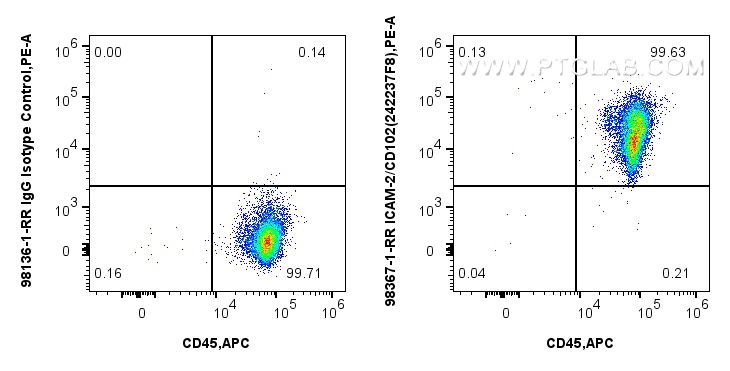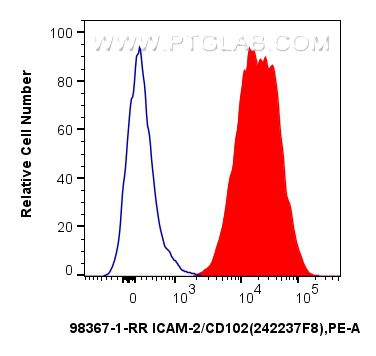验证数据展示
经过测试的应用
| Positive FC detected in | human PBMCs |
推荐稀释比
| Application | Dilution |
|---|---|
| This reagent has been tested for flow cytometric analysis. It is recommended that this reagent should be titrated in each testing system to obtain optimal results. | |
| Sample-dependent, Check data in validation data gallery. | |
产品信息
98367-1-RR targets ICAM-2/CD102 in FC applications and shows reactivity with human samples.
| Tested Applications | FC Application Description |
| Tested Reactivity | human |
| Immunogen | Recombinant protein 种属同源性预测 |
| Host / Isotype | Rabbit / IgG |
| Class | Recombinant |
| Type | Antibody |
| Full Name | intercellular adhesion molecule 2 |
| Synonyms | CD102, ICAM2, ICAM-2, ICAM 2, 242237F8 |
| Calculated Molecular Weight | 31kDa |
| GenBank Accession Number | NM_001099789.2 |
| Gene Symbol | ICAM2/CD102 |
| Gene ID (NCBI) | 3384 |
| Conjugate | Unconjugated |
| Form | Liquid |
| Purification Method | Protein A purification |
| UNIPROT ID | P13598 |
| Storage Buffer | PBS with 0.09% sodium azide, pH 7.3. |
| Storage Conditions | Store at 2 - 8°C. Stable for one year after shipment. |
背景介绍
ICAM2 is a cell adhesion protein having important roles in cell migration, especially during inflammation when leukocytes cross the endothelium. Initially described as a receptor for lymphocyte function-associated antigen-1 (LFA1), ICAM2 may play a role in lymphocyte recirculation by blocking LFA-1-dependent cell adhesion. It mediates adhesive interactions important for antigen-specific immune response, NK-cell mediated clearance, lymphocyte recirculation, and other cellular interactions important for immune response and surveillance.
实验方案
| Product Specific Protocols | |
|---|---|
| FC protocol for ICAM-2/CD102 antibody 98367-1-RR | Download protocol |
| Standard Protocols | |
|---|---|
| Click here to view our Standard Protocols |

